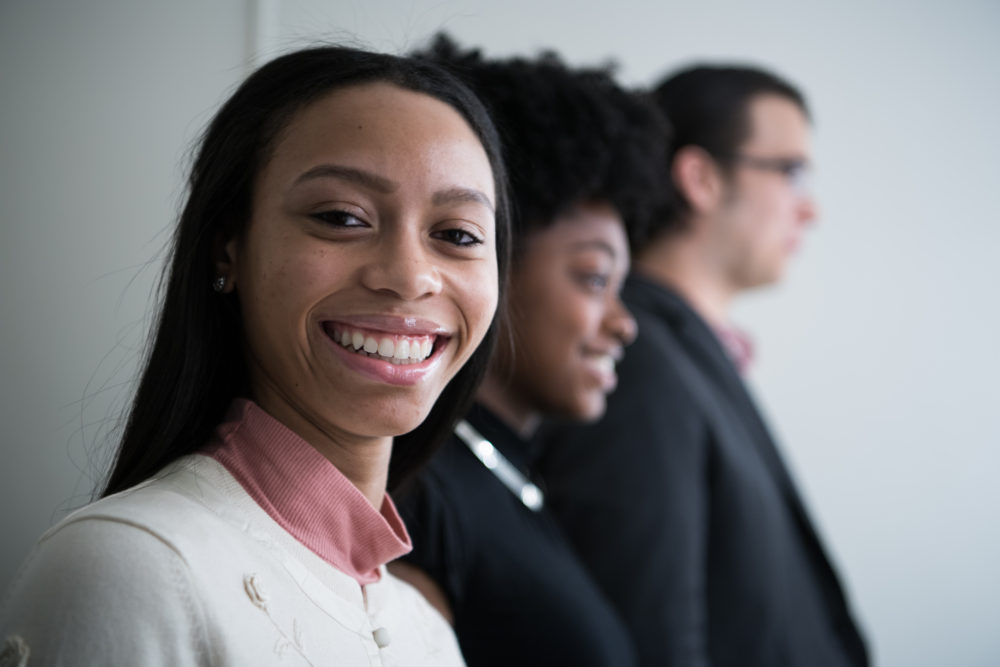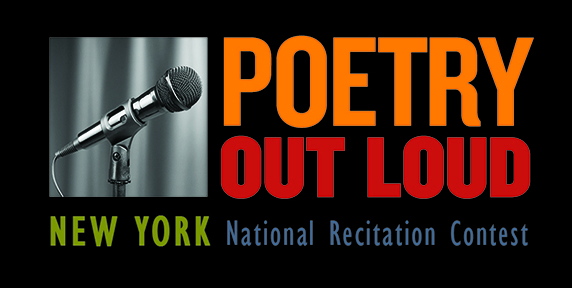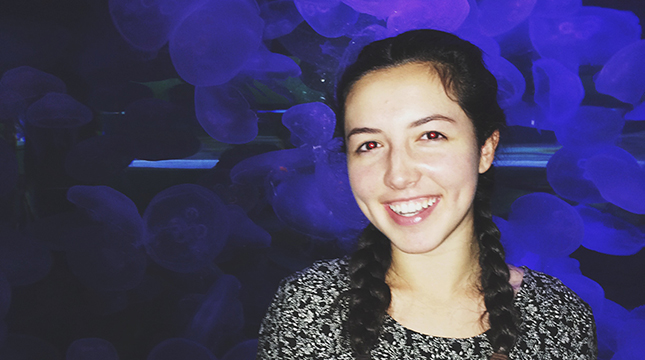When Iree Mann moved from southern California to the North Shore of Long Island and started her junior year at Syosset High School, she was introduced to Poetry Out Loud. After being named New York State Champion in March 2017, Iree went on to the national final in Washington, DC, finishing third in the competition. She spoke with poet, playwright, and long-time T&W teaching artist Dave Johnson about why she thinks Poetry Out Loud is an important program and the impact that it has had on her life.
Teachers & Writers: Why did you get involved with Poetry Out Loud?
Iree Mann: My teacher, Ms. Esslinger, mentioned it to a couple of her students. I looked it up, and I was like, wow, I like the way they’re reading this poem. So I thought, sure! I’ll try. So I did, and I ended up liking to read a lot of poems out of the huge anthology that Poetry Out Loud has.
T&W: Can you say a little bit about how you felt when you were chosen as one of the top three competitors at the 2017 national final?
IM: It was magical because I never felt that feeling before. I was kind of speechless. It was unreal. I guess that’s how I felt. It was unreal. It didn’t happen. But obviously it did. It was an amazing feeling.
T&W: How did you decide which poems to recite?

IM: Rita Dove. When I read her poem, I liked the way it felt, the feeling that I could feel when I was saying it. I could feel the passion and I could feel the energy. I liked that a lot, and that’s how I picked “American Smooth.”
And then, the “The Golden Shovel,” [Terrance Hayes]. I was not so crazy about it the first time Ms. Esslinger mentioned it to me. One, because it was super long. Two, because I really didn’t understand everything that was going on in the poem until we sat down and we went line for line. And that’s when I felt the energy in the poem. It was like every word in the poem was an action. And it was a story that I also liked because I can relate it to a lot of people that I know. I can relate it to a lot of men in my life. And it was kind of relaying a message to my people, in a way, and I enjoyed that.
And then the third poem, “Break of Day,” [John Donne] was just a fun poem. It was like a silly, fancy, sassy poem. And I thought I needed to have a balance of something serious and something fun to play with. And I thought it was cute how a woman just doesn’t like when a guy has to get up and go to work after they’ve had a nice night and a nice time with each other. And I thought it would be nice to kind of play off of that and say that to an audience.
T&W: So you saw them as a set really. I mean the three poems—how they played with each other in a sense.
IM: Yes, I liked that all of the poems had their own story and their own tone, and I enjoyed doing that. I thought if I had all different poems it would be great to listen to.
T&W: Can you say a little bit about how you prepared for each competition?
IM: We would always go line by line for each poem, and I would always have the poem in my back pocket or in my bag. It was always close to me. And a lot of times I would just read it over and over, like it was my first time reading it. And then, before the competition I would always pray or just kind of get everything out of my head and not think of anything, and then go on stage, and then kind of have everything coming back into my body for the first time so it could be natural, so it could be in the moment.
I would always have the poem in my back pocket or in my bag. It was always close to me. And a lot of times I would just read it over and over, like it was my first time reading it.
T&W: You mentioned that you carried the poem with you physically, in your back pocket. Can you say a little about that? You had it with you a lot?
IM: Yes, because at some moments I would feel the need to say a line from John Donne’s poem. Sometimes I would feel that way, or sometimes I would feel like a guy…. I’m trying to think of a word that I could use to describe “The Golden Shovel.” Just like a person that’s kind of lost and upset, and has a lot of rage. Sometimes I would feel like that and I would have the poem and I would relate to the poem and kind of feel that.
T&W: That’s very interesting, the idea that you would actually exercise the lines in your real life. I mean, that’s really compelling to hear.
IM: At times you feel upset or you feel enraged, and you kind of relate to one of the things you’re reading, or that person in your book, or that character in a play. And that’s how I felt about the poems, because they’re so different and I would feel like each one of those people in the poems at times throughout the day.
T&W: So when you exercised those lines in real life, how did that affect you when you went back on stage? Did you feel like you brought that moment, that emotion back to your performance?
IM: Well, I tried to as much as possible. I tried to be real as much as I could. If this poem is calling for a person in rage, I try to think back to when I was like that, because that’s the only way I can tell the story to the audience.
T&W: Could you say a little bit about progressing in the competition from the local level and the regional, and on to the state and on to the national final? What was different about those?
IM: At the local level I felt I had to kind of hold back a little bit. I couldn’t do a lot of gesturing or really let the poem out as much as I could on the final stage. The first local was very…. I guess homey. I knew some of the people and I knew I was at home. And for the state level, I just felt like I have to do as well as I possibly can because if I don’t, this is going to be the last time. So I guess I liked the energy at the state level, because it was give it all now or else you don’t go further.
T&W: Was there a big difference between the state final and the national final?
IM: Not for me because I’m doing the same thing. I’m trying to tell the audience a story, and I’m trying to bring the same realism to the poem, and I don’t think anything changes. The environment will sometimes make you feel a certain way, but to me, it’s just do your thing every time you go out there.
T&W: So you would advocate being consistent then, being very consistent each time.
IM: Well, as consistent as you can. But things change. You could feel one way when you’re reading the poem, and you think, oh—I like when I say it this way, and it kind of sounds better then. Sure.
T&W: Did you do POL when you were in California?
IM: No, I didn’t. Last year was the first time that I ever heard of it.
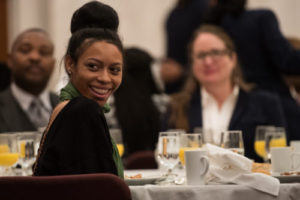
T&W: So that was your first experience and you went all the way.
IM: Yeah, it was really awesome!
T&W: That’s fantastic! From your whole experience with POL, what surprised you the most?
IM: I guess how poetry could just bring everybody together and make you think in a different way. That’s what made me appreciate Poetry Out Loud, and that’s something that I never thought could happen. I never knew that people would listen to this random person’s story and enjoy it and love it and keep it and listen to it.
T&W: What would you say the best thing is about participating in Poetry Out Loud?
IM: It’s the experience, because I’ve never been in anything in school that would help you learn, would help you meet other people, help you with literature and how things are said. It’s the experience of being with other people and telling stories and being together. I think that’s the best thing.
T&W: You say it also helped you in the learning process.
IM: Yes, it did. I look at literature in a different way now. I really want to know the story more because poetry… Even three lines can be a whole story. It helps me figure out what it actually means in the books that we read in class and things like that.
It’s the experience of being with other people and telling stories and being together. I think that’s the best thing.
T&W: This might be a little more of a stretch, but do you think it helped or influenced you in any way with subject matter outside of literature?
IM: I guess in music I can see that connection because every song has a story, just like every poem has a story. Every song that I’ve ever heard, I never was interested in the story. I was just interested in the beat and the tune. But I guess now I think, what is that person saying? Because I learned that every poem has a story, so I guess that every song could have a story. And I do listen to the lyrics more than I used to.
T&W: It kind of makes me think as you say that that every poem has a story, and every song has a story, and every person has a story. Everyone you meet. Everyone you pass by.
IM: Yeah, yeah.
T&W: What would you say is the hardest part of the program for you?
IM: I guess being the people in the poem, or trying to relate to the poem. At first, it was difficult for me to relate to a woman who’s upset about her man leaving her. It was difficult, at first, for me to find the comedy in that. And it was also difficult for me to understand why the boy in “The Golden Shovel” is enraged towards the end of the poem. I guess the technicalities of the poem sometimes are difficult, and to relate to the poem sometimes can be difficult.
T&W: If another student asked you whether they should take part in Poetry Out Loud, what would you tell them?
IM: I would tell them, do it! Yes, absolutely do it. Because it’s an experience that you never get. You never get people to actually listen to you, and actually want to listen to you, and actually want to hear the ending and what you’re going to say. And I feel like sometimes, when you don’t know how to explain yourself to somebody or you don’t know what you’re feeling, pulling out a poem is the best thing that you can do. Because a lot of times people write things that you can’t say, but it’s right there in the poem. I never thought that if I was reciting a poem, someone would listen to me, and that was a great feeling to have. And I think sometimes kids need to be listened to.
T&W: I guess what I’m hearing—tell me if I’ve got this right—is that when you select that poem, you’re kind of looking for something that would match the way you feel about something. So that when you say it, you feel like it’s deeply connected to you in that way, and when someone hears it they hear you in a way. Is that somewhat true?
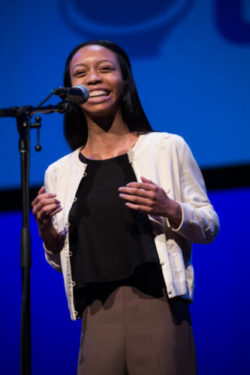
IM: Well, I don’t think the poem has to be you, because sometimes you don’t want to be yourself. You want to just tell the story. I just feel that everyone should pick a poem that they like, that they enjoy, that they have some capacity to relate to. If they want to tell someone else’s story, then go ahead. Someone wrote that and they would like for somebody to tell their story. I think that’s what a lot of kids in the competition, including me, wanted to do. I wanted to tell this girl’s story [in “American Smooth”] about how she loved to dance and how she felt when she was dancing.
T&W: Have you always been interested in poetry?
IM: Well, I knew this friend who was always interested in poetry, and I would love when he would recite his poems to me. But I was never involved in poetry like this, ever before in my life. I wrote one poem when I was a freshman in high school, but that was it. I never really respected poetry until I knew people that absolutely adored it and wanted you to tell the story of the poet that they absolutely loved.
T&W: Did doing POL make you think differently about it in any way?
IM: Oh, definitely. Hearing the poems that the other kids picked, it honestly made me think, oh—I’ve felt like that before in my life. Oh, I know a person like that. It made me realize how much poetry can connect to me, or how much those poems do connect to me or are me. That’s also why I always carried those poems in my back pocket, because they were mine. They were my stories. I want to share them—not anyone else. They’re my people here.
T&W: You said something interesting about listening to other people reciting their poems. Do you think that’s an important part of it, to hear everybody else do their poems as well?
IM: I do, because you’ll learn things from how other people say their poems. That’s why I enjoyed listening to the poems, because it gives you a different way to think about the poem. You can read something in your head, and you can hear someone say the poem, and it’s totally different.
T&W: What would you say you learned about yourself from participating in Poetry Out Loud?
IM: I never thought that I talked as much as I did at Poetry Out Loud. [laughter] I’m very reserved, but at Poetry Out Loud I really wasn’t. I wanted to meet new people. And I guess I learned that whenever I really like something and enjoy it, I become a different person. I talk to people. I get out there more. It allows me to be very…. Open. Because I was excited for people to hear me. A lot of times I wasn’t as excited to read in class maybe, but here I was excited to tell these stories.
T&W: Would you say it’s different reciting in the classroom?
IM: Oh, yes! As I said before, people want to hear you at Poetry Out Loud. Sometimes in a classroom, people don’t want to hear! [laughter] It’s so different. The atmosphere, the energy. People want to be there.
T&W: You said a minute ago that you had written a poem in your freshman year. Are you writing poetry now?
IM: Every time I get the chance to, I do. And I record myself on the phone saying something that I wrote when I’m walking my dog and things like that.
T&W: Did being in Poetry Out Loud make you feel like you want to connect to writing more?
IM: Oh, yes. Because I want to tell my story just like how that poet told their story. I want to make it so concise, so specific now when I write for myself. Or even my college essay. I wanted to just get to the point. In a lot of the poems, that’s what happens. Sometimes it’s just three lines, and they get right to the point. And that kind of helped me in writing my college essay. I didn’t want to put any fluff in it. I wanted to get right to the point of what I’m writing about.
I want to tell my story just like how that poet told their story. I want to make it so concise, so specific now when I write for myself. Or even my college essay. I wanted to just get to the point.
T&W: You’re in your last year of high school now?
IM: Yes, I’m a senior.
T&W: Do you know what you’ll be doing next?
IM: I’m going to be trying out for performing arts colleges. I’m majoring in theater.
T&W: And what are your long-term goals?
IM: I want to become an actress. That’s something that I’ve been wanting to do. It’s something that I’m working towards.
T&W: Do you see yourself writing your own parts?
IM: Yes, I also want to do playwriting. I enjoy that. I actually wrote a couple of plays. I want to write my own things so I can tell my own story, or tell another person’s story that doesn’t want to tell their story. Be a voice for them the way I think poetry is for other people.
T&W: That’s fantastic. I love to hear that because that’s what I did. Poetry and then performing, and realizing eventually that I wanted to tell my own stories, write my own plays.
IM: That’s wonderful!
T&W: I’m very happy to hear that’s what you’re doing. Is there anything else you’d like to say to any potential Poetry Out Loud participants?
IM: It was such an amazing experience. That’s what I want to say. It’s exciting! Having someone listen to you is incredible, because a lot of times people don’t want to listen to you. And at POL, everybody wants to listen to you. [laughter]
T&W: Thank you again, Iree, and congratulations. You were an absolutely incredible performer this year and we look forward to seeing what’s up next for you.
IM: Thank you for listening to me!
If you are in New York State and want to learn more about Poetry Out Loud, please email pol@twc.org. To find POL coordinators in other states, go to the national Poetry Out Loud website.
Photo (top) credit: James Kegley

